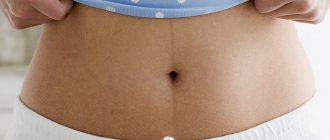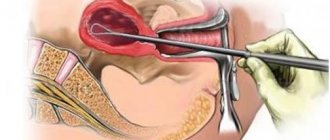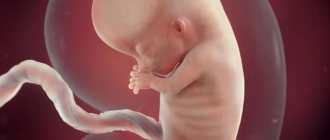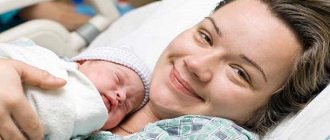During pregnancy, a woman feels changes occurring in her body. Changes are caused by the growth and development of a new organism. Symptoms of toxicosis are replaced by digestive problems from the second trimester. Constipation, swelling, and diarrhea become frequent companions. Abnormal bowel movements are associated with an increasing load on the uterus, which puts pressure on the internal organs. Diarrhea becomes common at 37 weeks. The causes of loose stools and ways to get rid of the pathology will be given in this material.
Diarrhea at 37 weeks of pregnancy
During pregnancy, conditions such as diarrhea or diarrhea may occur. During pregnancy, this condition is indicated in cases where stool becomes more frequent and its consistency changes (becomes pasty or liquid). Most often, constipation occurs during pregnancy, since at this time certain changes occur that negatively affect intestinal motility. We are talking about the relaxing effect of progesterone, increasing the pressure of the pregnant uterus on the intestines, etc.
Pathological causes
There are a number of reasons that cause stool liquefaction in pregnant women at the thirty-seventh week, which doctors classify as pathologies.
Poisoning
Most often, diarrhea occurs after consuming expired and low-quality food and drinks. Acute poisoning has certain symptoms:
- heat;
- nausea;
- gagging, vomiting;
- general weakness;
- dizziness;
- no appetite.
The presence of at least one or two symptoms aggravates the situation, since not all medications are approved for use during pregnancy. In case of acute poisoning, it is better for a woman not to risk her health and call an ambulance.
Many expectant mothers feel disgusted by certain foods. Therefore, after eating, stomach turmoil and diarrhea occur.
Poisoning doesn't just happen from food. Medicines and household chemicals are dangerous during pregnancy. If a woman needs to take any pills or use injections, before the procedure all the details of treatment are discussed with a specialist. It is better not to use household chemicals at all or to purchase hypoallergenic ones.
Worms
At the thirty-seventh week, loose stool may occur due to parasite infection. When helminths enter the body, they remove all water from food. This disrupts the normal functioning of the intestines, and the woman suffers from diarrhea.
Worms are extremely dangerous. Their presence after penetration into the intestinal tract is unnoticed for a long time. Only the symptoms, which can appear a couple of months after infection, will tell the expectant mother about helminths:
- persistent nausea and frequent vomiting;
- severe headaches;
- rashes on the skin;
- aching pain in the navel area;
- severe bloating.
Only a doctor can identify the problem. To detect worms, you will need to undergo some examinations. If parasites are detected, treatment is prescribed either before or after childbirth.
Allergic reaction
Pregnant women's bodies are extremely sensitive. Diarrhea often occurs due to an allergic reaction caused by some food. Usually the problem due to allergies is not accompanied by any symptoms or pain, so diarrhea is not dangerous.
Diarrhea ends as soon as the allergen is completely eliminated from the body, identifying which is not an easy task. To do this, the doctor prescribes a special diet that excludes any nuts and dairy products from the menu. You are allowed to eat only boiled rice, gradually introducing familiar foods. If an allergy appears during dietary nutrition, the product or drink is removed from the further diet.
Infection
Many infectious diseases, for example, influenza, rotavirus, dysentery, cause loose stools at the 37th week of pregnancy. Such causes are considered dangerous, since they are treated with special drugs that are not always allowed for pregnant women.
If a woman experiences the following symptoms, she should immediately consult a doctor:
- dehydration of the body;
- severe weakness;
- high fever accompanied by vomiting;
- long lasting headache;
- pain throughout the body;
- chills.
The symptoms cannot be ignored, as infections cause intoxication of the entire body. This has an extremely negative impact on the general condition of the expectant mother and child.
Stress
The emotional background of a pregnant woman is unstable. Even at the thirty-seventh week, sudden mood swings occur, accompanied by nervousness and stress. This condition is quite normal, because hormones rebuild the female body even towards the end of pregnancy.
A significant disadvantage of this is the softening of the stool. This happens because hormonal changes prevent the absorption of the required doses of fluid. Hormones also disrupt the peristalsis of the large and small intestines, which leads to diarrhea.
Preventive measures
The best method of combating diarrhea during pregnancy is prevention. The expectant mother needs to carefully monitor her own diet. When purchasing food products, check the expiration date, composition, and packaging.
Cooking should include complete heat treatment (meat, fish, other seafood). Vegetables and fruits should be doused with boiling water when washing. Particular attention is paid to personal hygiene. Be sure to wash your hands before eating.
We recommend: What to do when a child has a stomach ache and diarrhea?
Danger
It is almost impossible to predict the moment of birth of a child with absolute accuracy. Diarrhea can be a harbinger of upcoming labor only under the following circumstances:
- absence of concomitant symptoms of dyspeptic syndrome;
- signs of false contractions;
- change of mood;
- improvement of the breathing process;
- frequent discharge of urine and feces;
- prolapse of the abdomen.
The presence of an infectious disease threatens to be transmitted to the baby directly during childbirth. Sometimes there is a risk of infection of the baby while still in the uterus through the placenta. Persistent diarrhea earlier in pregnancy can speed up the labor process. Diarrhea stimulates intestinal spasms, activating the uterus.
Important! Diarrhea causes maternal dehydration, increasing the risk of fetal hypoxia.
Treatment options
Diarrhea is dangerous and requires immediate treatment if it occurs 5 to 7 times a day for 7-10 days. There is no point in brushing aside the problem, especially if it has certain symptoms.
Today, there are a number of effective and absolutely safe ways to treat diarrhea.
Drugs
Since many medications are contraindicated for pregnant women, it is better to entrust the treatment of diarrhea to a specialist. He will find suitable medications depending not only on the duration of pregnancy, but also on the individual female physiological needs in order to exclude poisoning and allergies:
- Preparations of the sorbent group. These include the well-known Activated Carbon, Smecta, and Enterosgel. The work of drugs is aimed at collecting all toxic substances and removing them from the body. The drugs are approved for women who are in the thirty-seventh week of pregnancy, as they have no contraindications or side effects. But you cannot take tablets from this group with any other drugs.
- Antidiarrheal drugs. At the 37th week of pregnancy, antidiarrheal drugs Loperamide and Imodium are allowed.
- Antispasmodic drugs. If diarrhea is accompanied by pain and cramps, you can take medications such as No-shpa and Papaverine.
- Drugs that regulate intestinal microflora. Diarrhea washes out all the beneficial elements from a woman’s body. To restore balance, Linex or Hilak Forte are prescribed.
- Sedatives. Diarrhea caused by stress requires treatment with sedatives. A pregnant woman at the thirty-seventh week is allowed to take a course of medications that include herbal ingredients. This group includes Magne B6, Glycine and Novo-passit.
- Antibiotic drugs. Doctors usually do not prescribe any antibiotics to pregnant women, as they have a strong effect on the liver and remove all useful enzymes. But if diarrhea was caused by infections, antibiotic medications are acceptable, for example, Penicillin, Cephalosporin, Nifuroxazide. These drugs, if they enter the placenta, do so in small quantities that are not dangerous to the fetus.
Traditional methods
Folk remedies also help with diarrhea. Today there is a large assortment of them, and many are completely harmless to mother and baby.
To stop diarrhea in the thirty-seventh week of pregnancy, decoctions, infusions and other recipes are useful:
- The main “enemy” of stool disorder is potato starch, namely a decoction of it. To prepare the drink, take 1 tablespoon of the substance and pour boiling water over it. Only 1 glass is required. You need to drink in the morning and evening.
- Oatmeal is also included in the list of antidiarrheal folk remedies. Oatmeal broth is prepared as follows: take 50 g of dry product and pour 4 glasses of boiling water. Next, the resulting mixture, after thorough mixing, is left for four hours. After the expiration of the period, the resulting mush is boiled until a mucous consistency is formed. You need to drink 2 tablespoons six times a day.
- Kissels have long been considered “fixing” drinks. You can cook any you like. Particularly effective are those made from a mixture of rose hips and blackberries. And also those containing cranberries and lingonberries. Prepare jelly any way you like: either yourself, at home, or buy a ready-made mixture and cook according to the instructions.
- Pomegranate peel has special properties - it can stop even prolonged diarrhea. To treat the disorder, prepare a decoction of two tablespoons of finely chopped peel and 200 ml of water. Place the peels filled with water on the stove, bring to a boil and leave to steep for fifteen minutes. Before drinking, filter the decoction. Dose: 100 ml every three hours.
- If a pregnant woman feels that diarrhea is tormenting her due to stress, then soothing teas and decoctions will help her. You can prepare a drink based on regular black or green tea, adding mint, lemon balm, and chamomile. Or brew your own herbs.
- For diarrhea caused by parasites, eat some roasted pumpkin seeds on an empty stomach, as well as vegetable pulp. Watermelon also helps in the fight against worms. Also, onions and garlic are helpers in solving the problem if a woman is not intolerant to these products.
The advantages of this phenomenon
There are significant advantages to this manifestation. The 37th week of gestation during pregnancy may be accompanied by diarrhea and this is considered normal.
Nature arranges it in such a way that before labor begins, the body of the expectant mother cleanses itself. The intestines are released from feces along with all the excess.
This is useful not only for the mother herself, but will also make it easier for the future baby to pass through all the birth canals. No need to worry about this. In addition to discomfort, loose stools will not cause other problems.
Dehydration is excluded, since the stool is softened to a mushy state.
Loose stools at 37 weeks of pregnancy may be accompanied by other symptoms. Spasms, increased gas formation and flatulence appear.
For this reason, false contractions may occur, but this manifestation is not long-lasting, because lasts only a few days.
By this time, the intestines are completely released and all symptoms cease with the onset of labor.
Nutrition for pregnant women
Despite the imminent birth, nutritional recommendations will haunt you for some time. You and your child need protein and iron, iodine and magnesium, calcium and phosphorus, because what is not replenished with nutrition will be covered by your resource. The deficiency will definitely manifest itself after childbirth.
Eat beef and offal - boil, stew, bake. Love legumes and unroasted nuts, chicken and turkey, long-cooked cereals (not muesli), jacket potatoes or in foil, dairy products, cheeses. Apples and pears are now preferable to exotic citruses and pineapples. Eat more greens and fibrous vegetables. Avoid packaged juices and sodas. Coffee is possible, but only a little and of weak strength.
Study the principles of nutrition during lactation in advance. After giving birth, you will immediately begin to breastfeed your baby, and it is important to ensure full milk production with a special nutritious menu.
Nutrition for pregnant women
Recommendations for the expectant mother
If you haven’t yet thought through how the birth will take place, it’s time to start organizing it. Decide on the maternity hospital, the type of ward, consider whether you need a paid one, or you can limit yourself to a general one. Pack your things for the maternity hospital, unpacking two bags each - for yourself and for the baby. Instruct your husband or other loved ones where everything is, what to bring to you after childbirth, and what to bring before discharge. Leave stickers and notes with instructions so that your partner does not get confused and does not run around the store looking for what he needs.
Talk to your gynecologist to see if you need to donate blood for Rhesus conflict or undergo additional tests before giving birth.
Ventilate the room often, but beware of drafts. You may be driven by the desire to arrange your home to the maximum, and this is commendable. But don’t overwork yourself and leave some projects (for example, repairs, rearranging furniture, painting walls) for later.
Talk to your child often. He hears you perfectly, recognizes intonation, distinguishes his mother’s voice from his father’s timbre. Spend time in peace, being positive, listening to music or drawing. You are a real miracle, because you will soon let a new person into this world, who was recently a part of you.
Use of antibiotics
In the third trimester, the use of antibiotics is allowed. The child is developed, so medications will not lead to systemic disorders. The balance of risk and benefit should be taken into account by the attending physician. Antibacterial agents reduce immunity, disrupt microflora, and put stress on the liver. Side effects of drugs can negatively affect a woman’s general condition.
At 37 weeks of pregnancy, treatment of diarrhea with antibiotics is possible for infectious diseases caused by bacteria (for example, tick-borne borreliosis, brucellosis). They do not act on viruses, but they relieve secondary symptoms well.
Certain antibacterial drugs are contraindicated during pregnancy. Among the acceptable ones: Penicillin, Erythromycin, Cephalosporin and their analogues. These drugs cross the placenta in low concentrations.
In the last two trimesters, it is allowed to use Nifuroxazide . This is an antibiotic intended for the treatment of intestinal disorders of bacterial etiology (salmonellosis, E. coli). The drug has no systemic effect. It does not penetrate the intestinal wall. The course of treatment is 6 days.
When is diarrhea dangerous?
But there are cases that at 37 weeks of gestation, loose stools can signal danger.
If during this week of pregnancy diarrhea appears in the form of very loose stools, with green spots and vomiting, immediately seek help from a doctor.
The same should be done if the liquid feces have become yellow, foamy, and emit an unpleasant odor.
If all of the above symptoms appear along with a high temperature, then attributing this to preparation for childbirth is strictly prohibited.
Such manifestations are characteristic of an intestinal infection, which can occur at any stage of gestation. This week of pregnancy does not always indicate prenatal preparation.
If such symptoms are accompanied by weakness and constant thirst, consult a doctor immediately.
If loose stools at 37 weeks of gestation are not accompanied by any additional symptoms, and labor has already begun, it is important to inform your doctor about this.
Not only does the intestine cleanse itself, but there is also no need for additional use of a cleansing enema.
Prevention measures
Diarrhea at the 37th week of pregnancy is a rather unpleasant and sometimes serious problem that is better to prevent than to treat for a long time and carefully. There are a number of standard rules. They should be followed by every pregnant woman, especially in the last weeks of the term:
- Rule No. 1. Avoid disturbing the water balance - try to drink more clean water.
- Rule No. 2 – hygiene. Personal hygiene should always be maintained. But you need to be especially careful about the procedure in the last weeks of pregnancy. Young mothers should wash their hands with soap after each trip to the toilet, and before any meal, even if it is a small snack.
- Rule No. 3 – correct selection and storage of products. When visiting shops and supermarkets, pregnant women should be patient when choosing foods and drinks. All products must be carefully inspected for long expiration dates (if there are a couple of days left before the expiration date, leave the product on the shelf). The integrity of the packaging also plays an important role, since the slightest flaw can cause bacteria and even infections that cause diarrhea to enter the product.
- Rule number 4 - proper nutrition. A pregnant woman needs to review her diet to avoid diarrhea. At the 37th week of pregnancy, fried, smoked, dairy and fermented milk drinks and foods, any fast food, as well as berries, fruits and vegetables are completely excluded - they speed up intestinal function and provoke softening of stool. Before giving birth, refrain from visiting cafes, restaurants and purchasing ready-made food from stalls on the street. Eat more cereals and dried bread. Drying and purees are allowed.
Products also need to be stored correctly, in accordance with the recommendations given on the packaging. Do not leave prepared foods in the refrigerator for more than two days. It is better to cook in small portions and eat everything at once, especially during hot periods.
Diarrhea at 37 weeks of pregnancy is a common occurrence that occurs for many reasons. In any case, diarrhea cannot be ignored, as the consequences are dire for both the woman and the child. There are a number of effective and harmless ways to get rid of diarrhea. And to prevent the problem, a woman should follow simple rules.
Previous post What does orange loose stool mean and how to treat it?
Next entry Diarrhea in the last weeks of pregnancy - a harbinger of labor or a sign of an intestinal infection?










